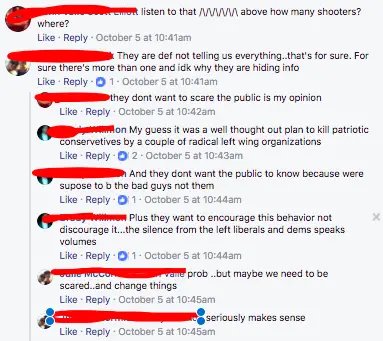
Conspiracy theories and the people who disseminate them are no longer on the fringe. Don’t believe me? Ask yourself this: How many people on my Facebook friends list have shared and bolstered stories that claim there was a “2nd shooter” in Las Vegas?
Quite a few, huh?
There was once a time where it was expected that the average person with a room-temperature IQ could at least process information like a thinking adult, not an impressionable child looking to titillate themselves with spooky things. Chemtrails, 9/11 conspiracies, “false flag” operations, a flat earth — a purveyor of one of these subjects will most likely believe them all.
Conspiracists don’t just stick to one theory; they devour every single one from the trough of their social media newsfeeds and regurgitate them back out into the world, constantly manipulating them so as to refute the debunker with a never-ending web of circular thinking.
In almost every video that has emerged from the horrific mass shooting carried out by Stephen Paddock from two broken windows in the Mandalay Bay hotel, media figures and their followers are finding “evidence” that there was more than one shooter in Vegas. But here’s the maddening part: it’s not evidence. What they offer are mind-numbing interpretations of video clips that show nothing. Nothing.
One example: Vegas truthers point to one particular video, claiming that evidence for multiple shooters lies in “muzzle flashes” that can be seen coming from sections of the hotel’s glass facade — other than the spot on the 32nd floor where Paddock slaughtered 59 concertgoers from his perch.
If you’re someone who has nurtured the essential evolutionary skill that allows you to understand what you’re looking at, it’s easy to see these are light reflections — on glass — in a city full of blinking lights — which tend to reflect on glass. I could belabor the point and provide other examples of this failed thinking, but I won’t.
So why do adults, who have families and careers and reputations to uphold, allow themselves to broadcast their childlike suspension of reality and lack of simple critical thinking skills to their peers on social media? As psychologist John M. Grohol writes in a recent op-ed for PsychCentral, it’s a combination of “openness to experience, distrust, low agreeability, and Machiavellianism.”
“Low agreeability” refers to a trait of “agreeableness,” which psychologists define as how much an individual is dependable, kind, and cooperative. Someone with low agreeability is an individual who is usually not very dependable, kind, or cooperative. Machiavellianism refers to a personality trait where a person is so “focused on their own interests they will manipulate, deceive, and exploit others to achieve their goals.”
In sum, people who gravitate towards conspiracy theories are more likely to connect dots that are actually random, or as researchers cited by Grohol describe it, “people with stronger conspiracy beliefs are more likely to overestimate the likelihood of co-occurring events, to attribute intentionality where it is unlikely to exist, and to have lower levels of analytic thinking.”

Studies cited by Grohol also point out that the need for “uniqueness” plays a role. Conspiracy theories usually rely on narratives that point to “secret knowledge” that only a select group of enlightened people are privy too. So if someone regurgitates these narratives, they’re sending the signal that they’re one step ahead of the human race.
The same research correlates extreme narcissism, “powerlessness,” and social isolation with conspiratorial thinking. When a person is rejected by their peers, they can easily find acceptance in groups that have likeminded belief systems. Additionally, conspiracies give the disenfranchised a convenient excuse to blame someone else for their predicament. Random events make everyone vulnerable, and believing that most tragic events have a shadowy agenda behind them relieves the fear of an unpredictable world — for some people.
As time goes on, more information about Stephen Paddock’s horrific attack on humanity will emerge, making the claims of ‘Vegas truthers’ even more laughable. “Save your breath arguing with people who believe in them,” Grohol writes. “as no amount of facts will dissuade them from their false belief.”
Featured image via YouTube





